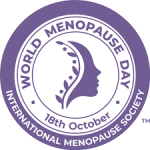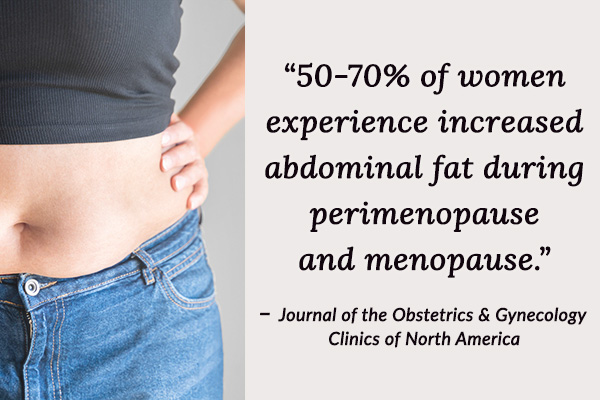 EDITOR’S NOTE: World Menopause Day – October 18th … here’s the latest from the Pioneer’s healthcare expert. Leanna Coy has a series of articles about menopause – links below. The theme for 2025 is “Lifestyle Medicine” which focuses on treating the individual with holistic approaches.
EDITOR’S NOTE: World Menopause Day – October 18th … here’s the latest from the Pioneer’s healthcare expert. Leanna Coy has a series of articles about menopause – links below. The theme for 2025 is “Lifestyle Medicine” which focuses on treating the individual with holistic approaches.
By Leanna Coy, FNP
When women would tell me about gaining weight later in life, I always said it wouldn’t happen to me. Then it did. What the heck! I’ve always stayed fairly active and eat pretty well. But, bam! Suddenly, I began gaining weight. A lot of weight. Most of it was in my midsection, which is one of the worst places for the body to hold extra fat.
Weight changes beginning in perimenopause are, unfortunately, very common. These changes can be dramatic and happen rapidly without you doing anything different with your lifestyle. Women who are obese have more severe menopausal symptoms, especially hot flashes, mood changes, and sleep issues. Understanding why the weight gain occurs can help you tackle this issue head-on.
What causes weight changes in midlife
Midlife is the span between the ages of 40 and 65 years. On average, a woman gains about a pound a year in midlife. This increasing weight is attributed to multiple factors. These include aging, hormonal changes, and lifestyle.
The aging body
Aging is the number one factor in midlife weight gain. With aging and the menopause transition, the body begins to lose its muscle mass. Women lose muscle mass at a rate of 3% to 8% every 10 years after the age of 30. How fast someone loses their muscle mass can relate to genetics and lifestyle.
A person’s muscle mass is a key driver in their metabolism. When the body starts to lose muscle mass, its efficiency in burning calories slows down. The body just becomes less productive. This is why women can gain weight despite continuing their patterns of eating healthy and exercising.
Hormonal changes
During the menopause transition, hormone levels begin shifting with estrogen levels dropping. These changes trigger the redistribution of fat in the body. Fat stores shift to the abdomen and thighs. Central weight gain like this is associated with a higher risk for heart and metabolic diseases.
The estrogen changes also trigger appetite changes. Estrogen regulates the body’s signals for hunger and feeling full. The fluctuating hormone levels lead to stronger hunger sensations.
Lifestyle
Lifestyle changes frequently occur in midlife that add fuel to the weight gain fire. Often, we become less physically active with sports or outdoor activities. Increasingly, many jobs are sedentary. Adults in midlife may experience life stressors, which can affect sleep and dietary choices. Sleep can further become disrupted during the menopause transition when someone is having night sweats or just waking every night at 3 am.
Health risks with weight gain in midlife
Concern about weight gain in midlife is more than just worrying about physical appearance. There are serious health risks that arise.
- Metabolic and cardiovascular diseases. Excess weight raises the risk for diabetes, high blood pressure, high cholesterol, and fat accumulation around the liver. These health issues are more worrisome when the excess weight is located around the abdomen.
- Multiple cancers are associated with excessive weight. These include breast, colorectal, and pancreatic cancers.
- Cognitive and mental health. Weight gain and obesity between the ages of 35 and 65 years are shown to relate to memory issues and cognitive decline later in life. Increasing weight is also linked to higher rates of depression.
- Problems with joints. Excess weight puts extra stress on joints, leading to a greater risk for osteoarthritis. An extra 10 lbs of body weight puts an additional 15 to 50 pounds of pressure on your knees.
What steps to take to reduce weight gain
For many women, their nutrition likely needs to change – even those women who’ve always eaten well. During the menopause transition, the body changes, and so do its needs. This may mean becoming more precise with your nutrition.
- Protein needs increase. In midlife, women need 0.7 to 1 gram of protein per pound of body weight a day. After the age of 65 or for women with low bone density, that amount increases to 1.3 grams per pound of body weight.
- Add fiber. The American diet is woefully lacking in fiber. Fiber helps you to feel full and aids in bringing down your bad cholesterol. Aim for 25 to 35 grams of fiber every day.
- Limit sugar. Sugars do not mean just sweet foods. Many sugars are hiding in beverages such as alcohol, soda, and sweet coffee drinks.
- Manage carbohydrates. High fiber and protein do not mean skipping the carbohydrates. Your body still needs them. Try to limit your carbohydrates to less than 100 grams per day.
- The Mediterranean-style diet is overall the most recommended diet for a well-rounded diet.
Physical activity needs change in midlife as well. For some women, this may mean slowing down. Others should pick up their pace. Regular exercise will help reduce fatigue and boost mood.
- Aim for 150 minutes of moderate aerobic activity a week.
- Avoid high-intensity workouts. Instead, focus on moderate intensity to avoid triggering inflammation.
- Strength training is needed to help build and maintain muscle mass. All women need strength training after the age of 35. Aim for 30 minutes of moderate intensity strength training three days a week.
Additional lifestyle factors include sleep and stress management.
- Aim for 7 to 8 hours of sleep by giving yourself an 8-hour window of opportunity to sleep.
- Keep a regular sleep schedule by going to bed and waking at the same time every day.
- Get assessed for sleep apnea if you are waking frequently, snoring, or fatigued in the morning.
- Manage stress with regular exercise, mindfulness, and counseling if needed.
Treating with medications and supplements
Hormone therapy is not a weight loss medication, but it can help slow the processes contributing to the weight changes. Adding estrogen back can help redistribute the fat stores away from the midsection to other areas. Estrogen can also help maintain muscle mass and reduce insulin sensitivity.
Weight loss medications are more popular than ever. They are shown to have benefits not only for weight loss, but can also reduce cardiovascular risks and provide protection to the liver and kidneys. However, these medications are quite expensive, often with limited or restricted insurance coverage. If you are interested in learning if you would benefit from a weight loss medication, talk with your healthcare provider.
Midlife weight changes are challenging and, often, frustrating. Staying proactive can help you manage these transitions head-on. Continue to maintain efforts at a healthy lifestyle while keeping in mind that your body’s needs evolve in midlife. Work with your healthcare provider for regular check-ups to monitor for changes in your health and develop a long-term plan of care. Take into account that weight management is not a quick fix. As your body changes in midlife, so must your mindset in accepting lifestyle changes for a life-long commitment.
IN GOOD HEALTH – PERIMENOPAUSE IMPACTS: The word is on the tip of my tongue – Brain fog!
https://www.tillamookcountypioneer.net/in-good-health-whats-going-on-down-there-changes-to-vulva-in-menopause/


.png)